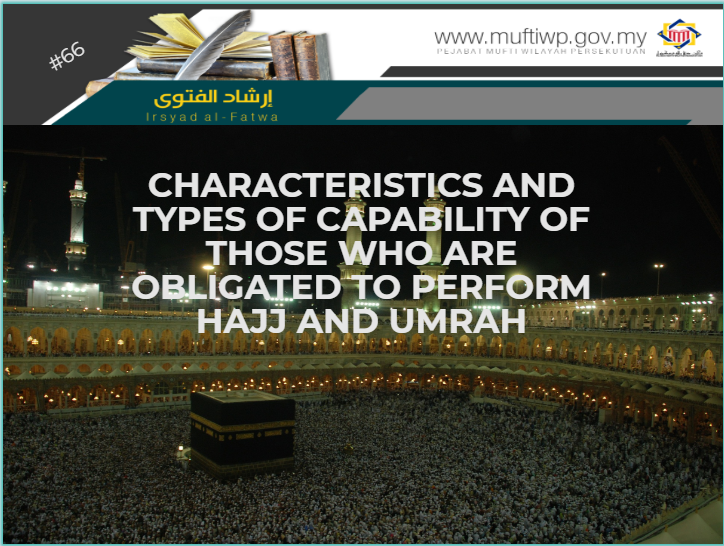Question:
What are the characteristics and types of capability of those who perform hajj and umrah?
Answer:
The Characteristics of Capability in Performing Hajj and Umrah
Allah says in the Quran:
وَلِلَّـهِ عَلَى النَّاسِ حِجُّ الْبَيْتِ مَنِ اسْتَطَاعَ إِلَيْهِ سَبِيلًا
“And [due] to Allah from the people is a pilgrimage to the House - for whoever is able to find thereto a way.”
(Al-Baqarah: 97)
Imam al-Nawawi in al-Idhah said: Capability (istitoa’h) is divided into two types:
- Direct capabilities of his or her own self
- Capabilities to perform it by others’ help
Characteristics of capabilities are as follow:
- One is considered capable when he or she possess enough wealth for him to complete the Hajj and umrah. Wealth referred here includes:
- Transportation
- Two-ways travel expenses including passport
- Wage for hajj/umrah guider as a requirement from the authorities
- The expenses or wealth for his hajj or umrah are his surplus savings (extra saving after the deduction of his debts and the expenses for his family during his pilgrimage)
- Physical health
- For women, they must be accompanied by their mahram or a group of other trusted (thiqah) women in their journey to Mecca
In a book entitled, Istitha’ah: Pengertian, Syarat dan Permasalahan Hukum, it states that a safe journey includes life and wealth. If a person is afraid of these things:
- Robbers, bandits or pirates
- Contagious or fatal disease like cholera, H1N1 (bird flu) and others
- Afraid of being hijacked
In this case, he or she is considered as not having the capability. It is in accordance to the legal maxim:
إنَّ كُلَّ تَصَرُفٍ جَرَّ فَسَادًا أَوْ دَفَعَ صَلاَحًا فَهُوَ مَنْهِيٌّ عَنْهُ
“Every conduct which brings harm or hinders the good is prohibited.”
Dr. Wahbah al-Zuhail said: “Safety here means the safety of life and wealth of the pilgrims along their journey to places that will or should be visited, with major assumptions (zan)”
It means safety as a whole. If one feels unsafe or worry upon the safety of his life, his wife, or his wealth due to beasts, enemies, bandits or robbers while no safe passages exist, it is not compulsory (wajib) to perform hajj in this situation due to these reasons.
Types of Capability in Performing Hajj and Umrah
Capability in this context is divided into two types, which are direct and indirect.
First: Direct capability means a man himself is capable in performing the hajj or umrah by his own. It is due to his good health, ability to embark in the journey and capable in completing all the rituals without any sickness or deficiency.
Second: Indirect capability means a mukallaf who possess enough wealth to wage others on doing hajj on his behalf while him being alive or after his death. This is due to his incapability in performing it himself due to some illnesses, old age or any other reasons.
It is based on a hadith which said:
يَا رَسُولَ اللَّهِ إِنَّ أَبِي مَاتَ وَلَمْ يَحُجَّ أَفَأَحُجُّ عَنْهُ قَالَ " أَرَأَيْتَ لَوْ كَانَ عَلَى أَبِيكَ دَيْنٌ أَكُنْتَ قَاضِيَهُ " . قَالَ نَعَمْ . قَالَ " فَدَيْنُ اللَّهِ أَحَقُّ "
'O Messenger of Allah! My father has died and he did not perform Hajj; shall I perform Hajj on his behalf?' He said: 'Don't you think that if your father owed a debt you would pay it off?' The man said: 'Yes.' He said: 'The debt owed to Allah is more deserving (of being paid off)."'
Sunan an-Nasa'i (2639)


